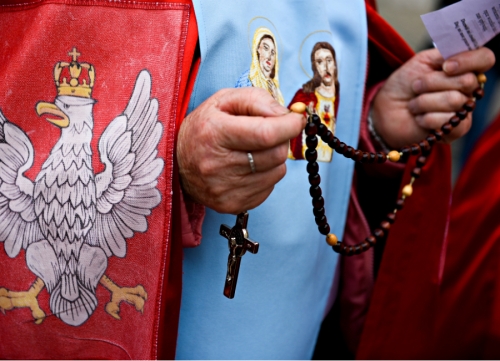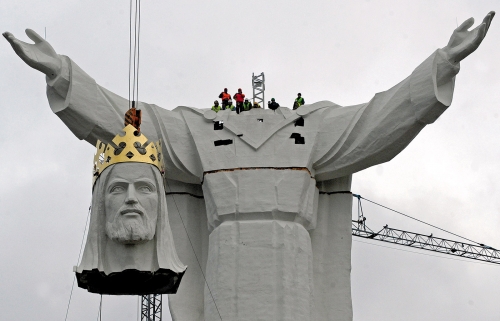
Christianity & Nationalism:
A Cautionary Tale
By Robert Hampton The arguments over identitarians should embrace or abandon Christianity is a question that still remains unresolved within the broader movement.
Last week, Quintilian entered the fray [2] and offered a reasoned argument for why white nationalists should embrace Christianity. The writer believes that white nationalists have fallen prey to the corrupted image of modern Christianity and fail to see the glory of the traditional faith.
According to Quintilian, Christianity is essential to the creation of an ethnostate and nationalists must strive to restore it to its traditional state. But identitarians should be wary of the possibility that a restored and conservative Christianity would be amenable to our cause.
In fact, this resurgent Christianity may be more inclined to fight against our movement, regardless of however much we profess our devotion to the faith. Quintilian deplores Vatican II as the event that destroyed the historical religion, but the Church was hostile to our beliefs many long before the bishops met in Rome in 1962. Take for instance the tragic tale of the Action Française.[1] [3]
Charles Maurras’s reactionary nationalist movement wanted to restore the monarchy, end the separation of church and state, and uphold France’s traditional Catholic identity. It was firmly opposed to liberalism and many of its economic and political beliefs were firmly in line with Catholic social teaching. Maurras himself was an agnostic, but he argued for the necessity of the Catholic faith and was extremely careful in allaying clerical fears about his irreligion. This should have been a movement the Church fully supported, and in its early years, many clerics did. The movement provided most of the militant activists in Catholic battles against the forces of secularism and liberalism in the first decades of the 20th century.
Yet, many Church intellectuals began to suspect the Action Française of being too militant, too political, too nationalist, and too, hilariously enough, pagan. Clerics began to suspect the nationalists were drawing young Catholics to an ideology not controlled by the Church. Church leaders preferred a safer political outlet that directed the youth to follow the instructions of priests, not pro-Catholic agnostics.
In 1926, the Vatican issued a formal condemnation against the Action Française, put their publications on the index liborum prohibitorum, denied communion to anyone associated with the movement, and purged sympathizers from the clergy.
This was the pre-Vatican II church led by a conservative pope. Unlike any Right-wing movement today, Action Française had plenty of bishops who were willing to vouch for the proper Christianity of Maurras’s newspaper and politics. Right before the condemnation, the movement’s leaders pleaded with Catholic authorities that they were true to the faith. All of this was for naught as the Church happily kneecapped an allied movement that it could not control.
This condemnation was not enacted by liberal modernists who wanted the Church to be more tolerant and heterodox. Maurras was attacked for failing to adhere to traditional dogma and his lack of genuine piety. His movement was seen as dangerous because it made the youth too nationalist and too enamored with classical ideals. Catholic leaders did not oppose the movement because of its anti-liberalism–it was simply because Action wasn’t directly controlled by the Church and its unorthodox ideas were more popular than Church-sanctioned ones.
The Church was also hostile to the Falange for the same reasons it condemned the Action Française, along with the accusation [4] José Antonio Primo de Rivera was a “Bolshevik” for wanting sensible social reforms. Even though the Falange was firmly opposed to liberalism, defended the Church from Left-wing attacks, and emphasized Spain’s traditional Catholic identity, Church authorities did not like the movement because of its ultra-nationalism, alleged crypto-paganism, and masculine values.[2] [5]
This hostility was par for the course for the conservative Pope Pius XI, who served as the vicar of Christ for much of this time period. Pius XI is considered a man who upheld traditional church teachings against the modernists Pope Pius X despised and is altogether a representative of the era Quintilian wishes the West to return to. However, Pius XI’s Christianity was strongly opposed [6] to racialism and nationalism. He spoke out several times against racial thinking, emphasizing that “catholic meant universal” and to divide the world by nationality and race is “contrary to the faith of Christ.” He ordered the drafting of an encyclical that would aggressively condemn racialism and anti-Semitism shortly before he died in 1939. The encyclical was never published, but many of its ideas found their way in the first encyclical of Pius XI’s successor, Pius XII. That work, Summi Pontifactus, [7]claimed there were no real racial differences as we are all part of one human race.
Quintilian blames modernism for the ultimate corruption of the Church, and this may be true when it comes to the god-awful liturgy of modern masses. But modernism is not what made the Church racially egalitarian and hostile toward nationalist movements. It is a feature that has been found in Christianity since the beginning and has only been tempered by the needs of secular society.
We can see this secular temperance in Poland and Hungary, the two exemplars of the Christian nationalism Quintilian envisions. The relationship between the Church and Eastern European nationalists isn’t as harmonious as one would imagine, but the Church restrains itself on their disagreements due to the demands of secular society. Poland’s leading Catholic bishops have long urged [8] the country to take in non-white migrants and to cease its efforts to purge communists from the judiciary. Some Catholic leaders in the country have gone as far as to deride [9] the immigration policies of the ruling government as “un-Christian.”
The Church hierarchy in Hungary is slightly better as they have argued [10] with Pope Francis over the pontiff’s aggressively pro-migrant stance. But even there, prominent Church leaders still urge [11] for more liberal immigration policies, albeit in more mild tones than that of their western colleagues.
The reason the Church is more muted in its criticism of nationalism in Poland and Hungary has less to do with them finding identitarian arguments in Thomas Aquinas than in their fear of alienating the flock. The vast majority of Poles and Hungarians want to keep their countries white, regardless of whether that desire comports to church teaching. Throughout the centuries, the Church has adapted its teachings and tone to reach the widest audience. Secular liberalism’s domination of Western Europe and America makes the Church try to sound nicer on LGBT issues and pitch God as your personal therapist.

In a society where nationalists control the discourse, the Church would similarly adapt to those circumstances, as Greg Johnson has pointed out [12]. But you first must gain power and dramatically change the culture to see this effect. A white nationalist-driven “restoration” of Christianity outside of a seizure of power is not going to happen. Institutional Christianity will continue to oppose us until that day comes, regardless of how Christian we appear today. Just ask Italy’s Lega, which seeks to put crucifixes back in classrooms and claims the Gospel as its foundation. The nationalist party receives only hostility [13] from the Church.
The resurgence of a more traditionalist Christianity wouldn’t necessarily help our cause. It would see us as an enemy and likely be as hostile to us as the corrupt institutions we face right now. As seen in the example of the Action Française, when you define yourself as a Christian movement, you become beholden to the opinions of priests and pastors. The clergy would want strict adherence to Christian dogma and would not broker “innovative” racialist readings of scripture and tradition. It would prefer we focus on side issues like banning contraceptives rather than protecting our people from demographic replacement. It would tells us African and Latin American Christians are our brothers and that there is no good reason to bar them from our countries.
To oppose these measures would risk condemnation and the deflation of our movement.
Identitarians must appeal to Christians in order to gain victory, but we mustn’t let ourselves be defined by Christianity. Our best arguments are secular and should appeal to Europeans regardless of whether they are Christian, pagan, or atheist. There is only so much energy and political capital we have and we must choose our battles wisely. To waste our limited energy on restoring Christianity to its pre-20th century state would be a serious error with no real rewards.
Notes
[1] [14] Eugen Weber, Action Francaise: Royalism and Reaction in Twentieth Century France.
[2] [15] Stanley G. Payne, Fascism in Spain: 1923-1977.